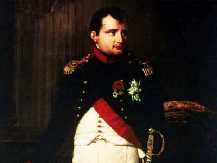Redeemed Twice
The Bible is full of stories of God's intervention in the affairs of men. He spoke to His people through dreams, visions, impressions, audible voices, strange events, and sometimes even through animals.
Our story for today is an amazing account of how God used an odd event, a strong impression, a voice, an animal, and a dream to speak to various people all for the sake of saving one man from certain disaster.
While Captain Jarvis was fast asleep in his own warm and comfortable Victorian bed, two men got into an argument in a tavern in a country town many miles away. One man, after being badly beaten by the larger and meaner man, vowed that one day he would kill him. Even though everyone in the tavern felt the same way about the detestable character, he laughed at the poor man's revengeful statements and walked out.
A month later Jarvis was in Plymouth for an overnight business trip. He had had a long and tense day, could not sleep, and walked around to look at the closed shop windows, the park and the famous Plymouth courthouse clock. Since the clock sounded off the hours with an unusual gong, he decided to wait around another few minutes to hear its memorable sound.
As he stood near the decorated marble base, he noticed another man staring at its peak.
"I'm going to hang around till it shakes this whole base with twelve loud gongs," the stranger said.
"I've never heard it strike, much less twelve times," Jarvis replied. "I'm sure that from the size of those bells it must really make quite a noise. I wonder how the poor folks near here can get used to it."
Just then the first striking of the clock began. One, two, three, four... Jarvis had to move away from the base somewhat as the vibrations in his ears began to resound again after each note ... eight, nine, ten, eleven, and twelve. But before he could move away from his listening place, the strangest thing happened. The clock struck one more time. The clock struck thirteen!
Jarvis went over to the other man and asked him if he had heard anything unusual.
"I was just thinking about coming over to ask you the same thing, but I was afraid that you might think I was a little loony," the other tourist said with a big smile. "You heard it strike thirteen times, too, didn't you?"
"Yes, I did," Jarvis said. "And I thought that I might get laughed at if I told you I heard it go one more time."
They both laughed, discussed the most unusual incident, and then departed their separate ways.
Jarvis told a number of friends about it shortly after returning home. But, as things happen, the cares of business and his heavy involvement in his beloved church work and personal witnessing for the Lord, he soon forgot the clock that struck thirteen.
Several weeks passed and Jarvis found himself unable to sleep. All through the night the scene of the clock striking that extra time passed languidly through his mind. Then, before dawn he felt a deep impression that he was to go outside his house. The impression came to him, three, four, five times again. Each time there was a greater urgency pressed on him to go downstairs and out the front door.
"Why should I get out of this warm bed, get dressed, and go outside at this unearthly hour?" he asked himself.
Again an impelling force tried to move his mind to accept the fact that he was to go outside. "It's pitch dark out there," Jarvis told himself, "If I do go outside, what could I see?"
But as the feeling did not decrease but continued to greatly increase, he got up, put on his clothes, and went downstairs. And when he opened the front door there stood his groom with his horse, saddled and bridled, ready to be mounted!
"What's this?" he asked after he had momentarily gotten over the shock. "What are you doing out here with my horse at this terrible hour?"
"Sir," the faithful, long-time servant replied, "I know that you will find this very strange to accept, but I could not sleep. All through the night and up until an hour ago, I kept hearing some kind of mysterious voice telling me that you would be wanting the horse very early this morning. Since you had not given any orders like that, I had a real hard time, trying not to pay any attention. But, Sir, the strange sensation in my ears was like a human's voice and there was no one in the room. I turned on the light and looked. I sure do hope that I haven't done anything wrong."
"Oh, no, you haven't done anything wrong at all." Jarvis said to console the worried groom. "As a matter of fact you did exactly the correct thing- The thing I'm going to do. I'm going to obey those same "voices" you've been listening to."
Jarvis mounted the horse, but before moving an inch or giving the first command, he prayed out loud. "Lord, Some very strange things have happened in the last few weeks. First that clock striking thirteen-, then my impressions this night to get outside; and the good groom's instructions to get the horse saddled and bridled for me to ride. I cannot dismiss this as some passing fancy or freak of mind. I believe that You are telling me to do something very important. Now, since I do not know where to go or what it is You want me to do, please let the horse lead me there."
And with this said, he let loose of the reins, gave the horse a gentle nudge in its side and the horse started off at a healthy pace. It was strange to be sitting up on top of the gaiting animal, and not holding on to his reins. As they moved away from their house, it seemed as if the horse was heading down towards the riverside.
"If he's taking me to the riverside then this is all a mistake. There is only one ferryboat down there and the first run doesn't start until after sunrise. No one would be there for another two or so hours."
But the horse made its way directly to the ferryboat. And standing on the ferryboat was the conductor himself!
"I can't believe this!" Jarvis said to himself.
As he approached the ferryboat, he saw that the ramps had been lowered for passengers to board.
"I can't believe my eyes! What are you doing down here so very, very early when I've heard you say so many times that you love to stay in your bed to the very last minute, then quickly dress, and run out of the house eating your breakfast as you run?"
The ferryboat conductor told Jarvis another bewildering story.
"You're mighty right, mate, when you said that I love me sleep. Well, I had a terrible time sleeping. It seems like around the midnight hour I had a dream where I had to run down and ferry a man and his horse across the river. I dream about taking people across the ferry all the time and I still get me sleep. But this dream was different. It was like if I didn't get down there something terrible was going to happen. I woke up and I had been really sweating. I tried to get back to sleep, but sleep just wouldn't come. I kept feeling more and more like that wasn't any dream. So, I decided that if I got me down here and there wasn't anyone with a horse waiting to go across, then it was a supernatural thing. So, I had no choice but to come. And I just got here about a minute ago."
Jarvis led his horse up onto the ferry. And as the ferry slowly made its way across the river, he prayed even harder for God to give him the wisdom and strength to handle whatever his job was, wherever it would be.
Mounting his horse on the other side of the river, Jarvis once again let the horse go his own way. Soon the horse was off at an even faster pace. After what seemed an eternity, they approached a large country town where it seemed that not much was going on.
Approaching a man walking away from town, Jarvis stopped and talked with him. "Sir," he inquired, "is anything of real importance going on in this town today?"
"Well, I guess some folks think it's important," the man answered. "There's a trial going on in the courthouse. Don't mean much to me, tho."
"What kind of a trial?" Jarvis asked.
"Oh, some no-gooder shot and killed another no-gooder, that's all."
Captain Jarvis went to the courthouse, hitched the horse, and walked in just as the judge was addressing the prisoner. The courtroom was crowded and Jarvis slipped in the back and stood up against the wall.
"Have you anything to say for yourself?" the judge asked the prisoner, anything at all?"
The prisoner's back was to Jarvis and he could not see his face. The prisoner quietly answered the judge, "Your honor, I have nothing to say except what I've said before. I'm innocent of these charges. It's true that I disliked that old sot, and hated him something fierce when he beat me up like that in the tavern. A lot of people told you that they heard me tell him that I was going to one day kill him for what he did, but I was mad, hurt and ashamed. I had to say something. But, honestly, judge, I didn't kill him."
The courtroom was hushed. It seemed as if everyone was on the accused man's side. Then the prisoner added something that shook Jarvis terribly.
"Your honor," the prisoner said. "I was not here the night of the killing. I was on my way home from over beyond Plymouth. There is one man who can prove that I wasn't here at midnight of the killing 'cause we stood and talked together about the Plymouth clock striking thirteen ..."
The courtroom rocked with laughter, and the judge rapped his gavel on the desk to quiet things down.
"You say that you can prove that you didn't kill him because you were in Plymouth the night of his death, and that you can prove it if some man who talked with you there when the clock struck thirteen (the audience laughed again at this) instead of twelve would come up and attest to that. Well, all I can say is…"

"Just a minute, your Honor," Jarvis said as he walked directly up to the judge's desk and chair "This man is telling the truth. I would like to be sworn in as a witness and a friend of the court." .
In a matter of thirty minutes the condemned man was proved innocent, and was at once set free.
As Jarvis and the liberated man talked together outside the courthouse, the stunned man asked him what brought him to the trial-
"Well, my friend," Jarvis answered , some time back I came to know the Lord as a personal Saviour and friend. He redeemed me at Calvary. Now, through His mysterious intervention in the affairs and minds of my servant, a good ferryboat conductor, my old faithful horse, and myself, He has given you redemption from a death sentence."
As the two men spent the remainder of the day discussing the plan of Salvation, the freed man vowed to look into his becoming a Christian, too.
Two months later, Jarvis received a small note from the happy and most appreciative man. It simply read, "Redeemed Twice!"
How amazing to know that God could be so interested in us. "Nothing that in any way concerns our peace is too small for Him to notice.... No perplexity is too Difficult for Him to unravel. No calamity can befall the least of His children ... of which our heavenly Father is unobservant, or in which He takes no immediate interest." (Happiness Digest pg. 49,50)
How thankful we can be that God will still reveal His secrets of the future to us just as He did to Daniel in today's Bible Lesson.
Have you ever wondered why, from the days of the Pagan Roman Empire until now, there has never been a united Europe? It is not that no one has wanted it so indeed, many ambitious and talented men have tried to do so. There was Charlemagne who tried to do so in the eighth century, Charles V in the sixteenth and Napoleon in the nineteenth.
The answer to that question is simple. God has decreed that it will not happen. In today's lesson, you will find that through His prophet Daniel, God foretold the future kingdoms of this world. A strange image made up of different kinds of metals symbolized the progression of the ancient world empires. The feet and toes, however, were different. Daniel 2:42,43 states:
"As the toes of the feet were partly of iron and partly of clay, so the kingdom shall be partly strong and partly fragile. As you saw iron mixed with ceramic clay, they will mingle with the seed of men; but they will not adhere to one another, just as iron does not mix with clay".
For many years the royalty of Europe attempted conscientiously to assure permanent peace by means of intermarriage. At the outbreak of the first world war almost all the ruling houses of Europe were interrelated. Yes, at the outbreak of the first world war! The words, "They will not adhere one to another" even though they did "mingle with the seed of men" proved only too true.
Napoleon declared, "I wanted to found a European system, a European code of law, a European court of appeals". There would have been but one people throughout Europe. Europe would have become one nation.
The Kaiser Wilhelm II and Adolf Hitler tried in the twentieth century. Millions still living remember Hitler's piercing voice as in seemingly endless harangues he portrayed the Nazi goal, "Germany over all! [Deutschland fiber alles!]." But the seven simple words "They will not adhere to one another" were shown to be true in his case also.
C. Mervyn Maxwell was fourteen when Hitler violated Poland's Danzig Corridor. His family hovered around the radio listening to Britain's declaration of war as the short-wave came in, successively loud and soft, clear and garbled. The future was dark, but they had been brought up on Daniel 2, and were sure that sooner or later Hitler would be defeated by the Allies or by the second coming of Christ.
Hitler's Panzer divisions swept across Europe. Hitler, like Belshazzar, defied the God of Daniel. In March, 1941, Hitler boldly declared, "See my people? We do not need anything from God! We do not ask anything from Him except that He may let us alone. We want to fight our own war, with our own guns, without God. We want to gain our victory without the help of God." His tank divisions swept across Europe.
The Allied forces had their backs to the wall at the English Channel. At that stage of the war, it appeared that, in a few days, Hitler would conquer all of Europe. He had every military advantage. His generals carefully studied the weather patterns. They attacked at a time when the weather was pleasant, to enable the tanks to move swiftly against the Allied forces, and to keep the British from evacuating their trapped army from the shores of Dunkirk.
At this time, and after the fall of France, some students of prophecy cautioned young Mervyn's father, Arthur S. Maxwell, editor of Signs of the Times, not to continue writing editorials on Hitler's future defeat. "How do we know that the prophecy of Daniel 2 will apply in this case?" they asked. Maxwell replied by dedicating his next issue to this interpretation of Daniel 2 and inviting his readers to preserve their copies!
"This prophecy is the only one in the Bible," he wrote buoyantly, "to which the words 'certain' and 'sure' are both attached [Daniel 2:45]. If for no other reason, with these two seals upon it we can surely trust it with complete confidence. It cannot fail."
One night, when the Allies seemed hopelessly trapped, a strange fog settled in. Winston Churchill, in an emergency broadcast, appealed to the British civilians to assist in an evacuation. Power boats, family boats, yachts, barges, anything that floated was sent over under the cover of fog to rescue the trapped Allied troops. The Allied forces rescued and regrouped, went back, finally to win the war. Hitler had said, "We don't need anything from God! ... We want to fight our own war." But seven words of Bible prophecy "They will not adhere to one another" forbade such a takeover.
Arthur S. Maxwell, the beloved 'Uncle Arthur' to many children around the world loved to tell his children of the important part that the prophecies of Daniel played in his life. When Arthur was fourteen, in England, an evangelist's sermon on Daniel 2 attracted his widowed mother to the study of the Bible. It did not at first attract him to study the Bible. More than once young Arthur locked himself in the upstairs bathroom to escape the evangelist's house calls, then climbed to freedom down the outside English plumbing.
At the age of sixteen however, he gave his heart to Christ. Two years later, World War I began. During the terrible conflict he watched Kaiser Wilhelm II match his might for four years against the image of Daniel 2. Arthur S. Maxwell's confidence in the impregnability of the prophecy was confirmed. Maxwell's faith was ready when Adolph Hitler took his turn.
The toes of that great image hold special interest for us today. We can see that if the image represents a timeline, we are at the end of it. Rome no longer rules the world. There is no a single ruling power today. We are living in the time of the feet and toes of iron and clay that will not adhere to one another. The next event as you see in today's lesson cannot be far in the future. Friends, Jesus is coming very soon. Wouldn't you like to get ready for Him?








